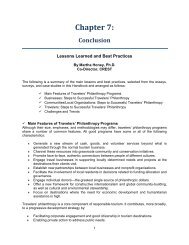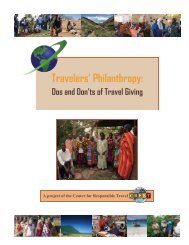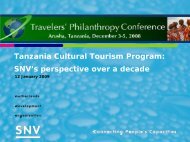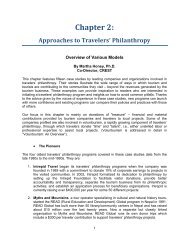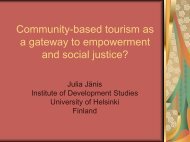Travelers' Philanthropy Handbook - Center for Responsible Travel
Travelers' Philanthropy Handbook - Center for Responsible Travel
Travelers' Philanthropy Handbook - Center for Responsible Travel
You also want an ePaper? Increase the reach of your titles
YUMPU automatically turns print PDFs into web optimized ePapers that Google loves.
Those surveyed also criticized volunteer programs, saying that although there are manyvolunteers, they help relatively little. They said that often volunteers are more interested ingaining experience <strong>for</strong> themselves rather than helping to bring long-term benefits <strong>for</strong> thelocal organization or community. Furthermore, they said, the volunteers often do jobs thatcould be easily done by local people who could get hired and paid <strong>for</strong> their work. Becausevolunteers typically pay to volunteer, the volunteer market has developed into an economicsector with a lot of competition between the different organizations and programs.Comments from those interviewed included:“There are too many different organizations.”“Volunteer programmes cost a lot and do not benefit the communities.”“Money does not reach the people in real need.”“Dependence on <strong>for</strong>eigners to develop.”“Money disappears in bureaucracy.”“It’s totally unorganized and badly managed. There’s no combined ef<strong>for</strong>t.”“If not managed well, donations can create continuous dependency.”“The current practices of philanthropy are more patronizing than empowering.”• RecommendationsThose interviewed said that travelers’ philanthropy initiatives are already quite widespread in theArusha area. However, they said that they believe that every tour operator should becomeactively involved in contributing to social service and conservation projects. The phenomenon oftravelers and tourism business donating money, time, or talent to address pressing local needshas tremendous potential to assist developing countries and their poorest regions.Survey participants went on to make a number of suggestions and recommendations <strong>for</strong> how toimprove travelers’ philanthropy practices and operations in the Arusha area; many of theseobservations are applicable to other destinations.A number of those interviewed said that it would be helpful to build up a joint initiative amongtour operators and the local organizations and communities. They recommended that touroperators create an umbrella organization, a “Tour Operators Initiative <strong>for</strong> <strong>Philanthropy</strong>,” thatwould pool ef<strong>for</strong>ts, set targets and goals, and make sure that local projects receive the supportthey need. They suggested that it would be better if companies supported collectively existinglocal organizations rather than creating new projects.In addition, respondents recommend long term philanthropic investments, geared towardshelping communities to help themselves become more sustainable and independent. Tourcompanies recognize that communities need to identify their own needs and priorities. Inaddition, they recognize that philanthropic activities managed by skilled and qualified employeesare likely to be more strategic and accountable. Donations should be directed to thecommunities and causes with the greatest need, but always through responsible persons ororganizations. Transparency must be guaranteed and projects and donation processes must beevaluated. They added that communities as well as tourists must be taught about both thepositive and the negative impacts that donations can have.157




